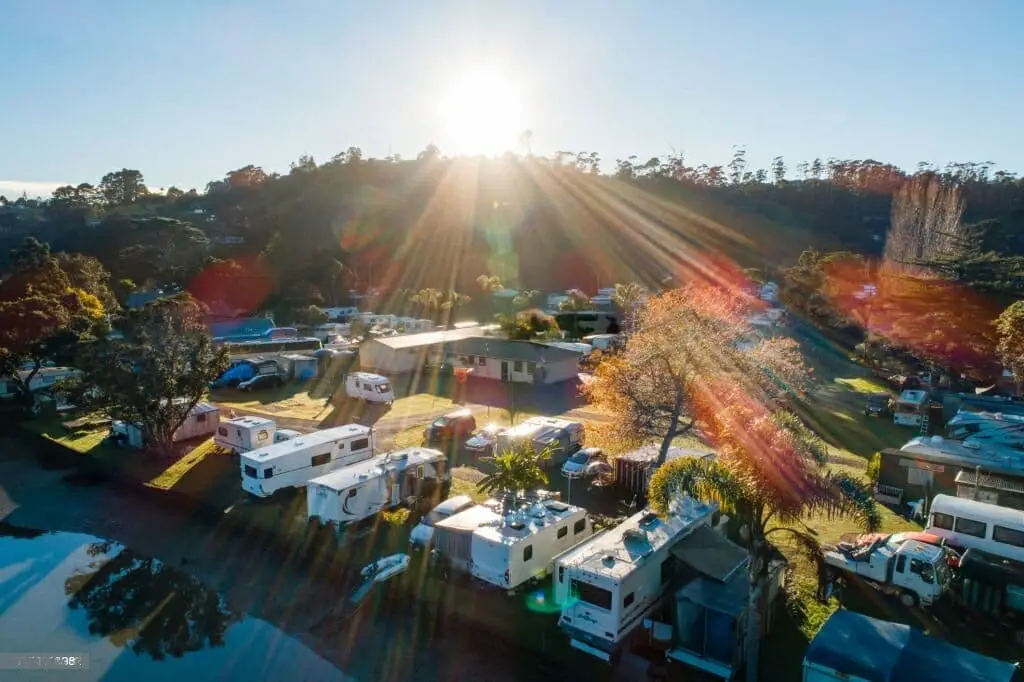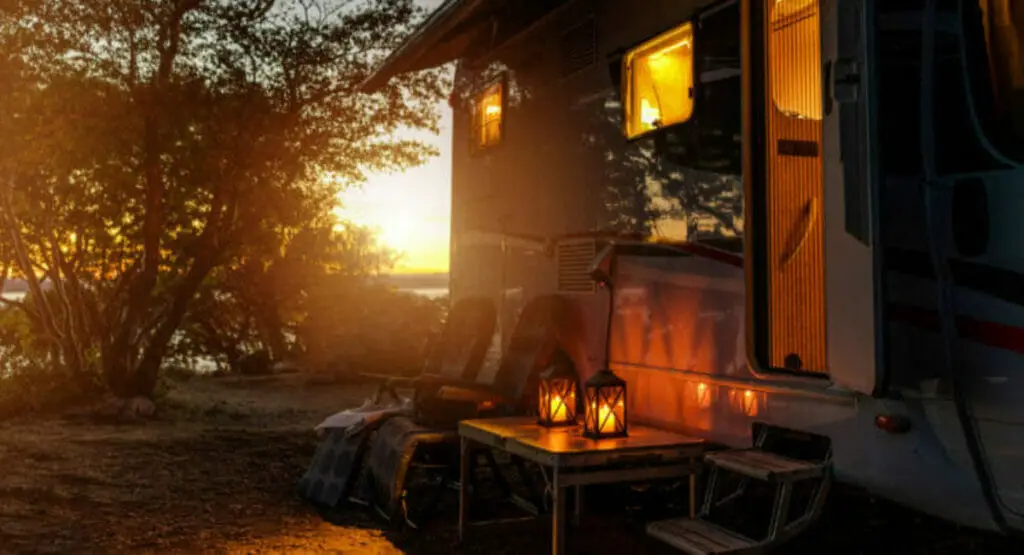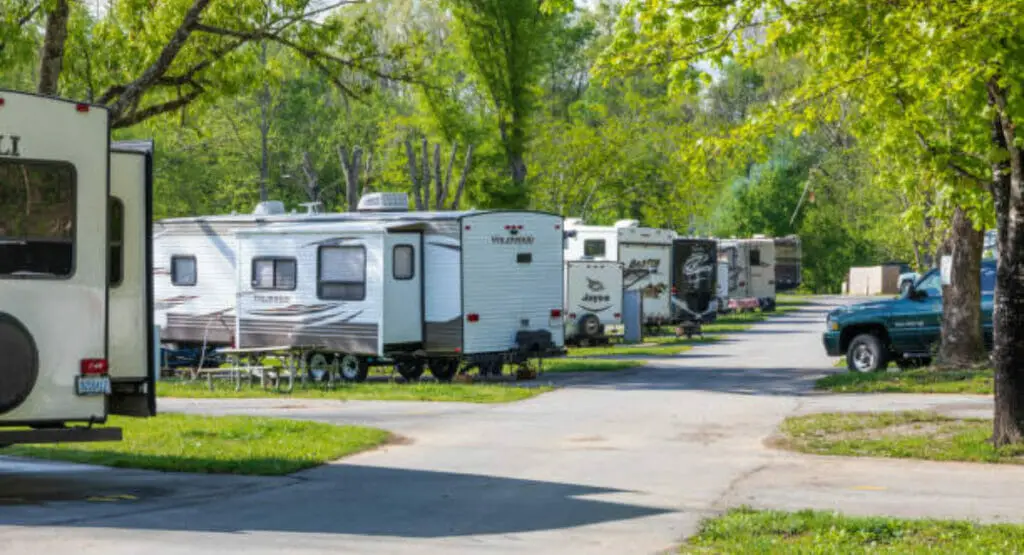People who want to enjoy the independence and flexibility of the RV lifestyle while still feeling a sense of community and having access to a variety of amenities and services may find living in an RV park full-time an attractive option. Living in an RV park full-time can be less expensive than typical housing, but it still comes with fees such as rent, utilities, and upkeep. Make sure you factor these costs into your budget. It is always best to check with a local attorney or financial counselor to understand the laws and regulations in your area.
However, it is crucial to understand the expense of living in an RV park full-time and how it compares to other housing alternatives. The cost of living in an RV park full-time might vary based on the location, facilities, and services available. Some RV parks demand a monthly or yearly fee, while others charge a daily or weekly rate. The cost might range from a few hundred dollars per month to over $1,000. There may also be additional energy, water, and sewer consumption fees. Clearly, this isn’t affordable to the great majority of people. Fortunately, there are alternative options. Here’s how you can save on RV expenses.
1. Understanding the costs of living in an RV park full time.
The various expenses related to living in an RV park full-time will be compiled for this goal. These fees could include daily or weekly rates for the RV site, monthly or annual RV site fees, and additional costs for utilities like power, water, and wastewater. Investigate and compare these prices among different RV parks in order to select the most affordable choice. Budgeting for these costs and making provisions for any unexpected expenses are equally important.
2. the price differences between various RV parks.
To study the pricing of different RV parks in various areas, you may start by searching online for RV parks in the specific locations you are interested in. You can look for websites or directories that list RV parks according to location and cost. Once you have a list of RV parks in the right locations, you can contrast each park’s rates and amenities to find the most affordable option. Moreover, you can also check user evaluations of the RV parks to get a sense of the general satisfaction of the visitors who have stayed there.
3. Amenities, Services, and Lifestyle Considerations
To analyze the cost of living in an RV park full-time, you should take into consideration the cost of the RV park itself, as well as any other fees involved with living there. The cost of the RV park will vary depending on location, facilities, and services supplied. Some RV parks may also offer differing pricing for short-term and long-term stays.
Additional fees to consider include:
1. Utilities: Water, power, and sewage hookups may come at an additional cost.
2. Insurance: You will need to obtain insurance for your RV and your personal goods. Make sure you have the necessary insurance coverage for your RV and personal goods. Some insurance policies may not cover full-time RV living.
3. Maintenance: Keeping your RV and its equipment in good working order will cost you money.
4. Food and groceries: Staying in an RV park will not impact the cost of food and goods.
5. Petrol and transportation: You will need to consider the cost of gas for your RV and any transportation charges for traveling.
It’s crucial to investigate several RV parks and compare the pricing and facilities to pick the one that corresponds best with your lifestyle and needs, considering the expense of living in an RV park full-time. Additionally, you can also check user evaluations of the RV parks to get a sense of the general pleasure of the visitors who have stayed there.
4. Budget:
To understand how to budget for living in an RV park full-time, it’s vital to first investigate the costs involved with the RV park itself, as well as any additional fees related to living there. Some RV parks may have varying prices for short-term and long-term stays, so it’s vital to learn the charges for the precise length of time you are planning to stay.
Entertainment and other personal costs Planning for unforeseen costs like unexpected repairs or medical expenses is also essential. You might consider getting an extended warranty or RV insurance, or you could set aside a certain sum of money in a savings account for unforeseen expenses. Additionally, you can also check for discounts and promotions given by RV parks and campsites to help you manage your living expenses. To make sure that your spending is on track, it is essential to create a precise budget and to regularly review it. This will assist you in budgeting your money wisely and avoiding any financial shocks.
5. tax implications
Since an RV park may be considered a permanent residence, living there full-time may have tax repercussions. Understanding how your situation will be viewed for tax purposes requires consulting with a tax expert.
6. RV Park Living vs. Traditional Housing
One of the biggest advantages of living in an RV park is the cost. Rent, utilities, and upkeep can be much lower than standard housing options, making it a more economical option for individuals on a budget. Our level of mobility is also increased by living in an RV compared to other types of housing. There are many RV parks across the nation, giving locals the chance to travel to new places.
RV parks are generally less expensive, more movable, and give a sense of community, but they also have restricted space, weather restrictions, and a lack of privacy. It ultimately depends on the individual’s lifestyle and inclination. It’s critical to weigh the benefits and drawbacks and take into account whether a full-time lifestyle in an RV park corresponds with the needs and preferences of the individual
7. Saving Money Strategies for Full-Time RV Park Living
Living in an RV park full-time can be a cost-effective housing option, but it still comes with fees such as rent, utilities, and upkeep. There are numerous methods that can be used to help save money.
1. Negotiating rates:
Before committing to a long-term stay at an RV park, negotiate the rate with the park administration. Ask if they give any discounts for long-term stays or if they are ready to negotiate a reduced charge.
2. Utilizing discounts:
Many RV parks provide discounts for veterans, the elderly, or Good Sam members. Be careful to inquire about these savings and take advantage of them if you qualify.
3. Cutting back on needless spending:
Look for ways to cut back on unnecessary expenses such as eating out, cable TV, and phone plans. Cook at home instead of eating out, and consider using streaming services instead of cable.
4. Finding free activities:
Look for free things in the local area to do instead of spending money on entertainment. Many RV parks feature recreational facilities such as swimming pools, game rooms, and more.
5. Maintenance:
Regular maintenance of your RV will save you money in the long term. Keep your RV in good shape by completing routine maintenance and repairs. Look for off-season pricing.
Consider staying in RV parks during their off-season, when rates are often lower. It’s crucial to be cautious about your spending and to look for ways to save money. By applying these tactics, you may help keep your expenses low while still enjoying the perks of living in an RV park full-time.
Conclusion
When evaluating RV parks, it is crucial to take into account the facilities and services provided, such as showers, laundry rooms, and internet connections. Additionally, some RV parks have on-site entertainment options like playgrounds and swimming pools. The location of the RV park must be considered in order to determine whether it is in a desirable area. It’s also important to know the financial and legal ramifications of full-time RV park living. This includes zoning rules, which might vary based on the region, and tax ramifications. Additionally, a specific license or permit might be required in order to live permanently in an RV park.
All in all, settling down into a full-time lifestyle in an RV park may be a cost-effective and enjoyable option, but it is essential to carefully research and weigh the costs, amenities, and legal and financial factors before making a decision.



